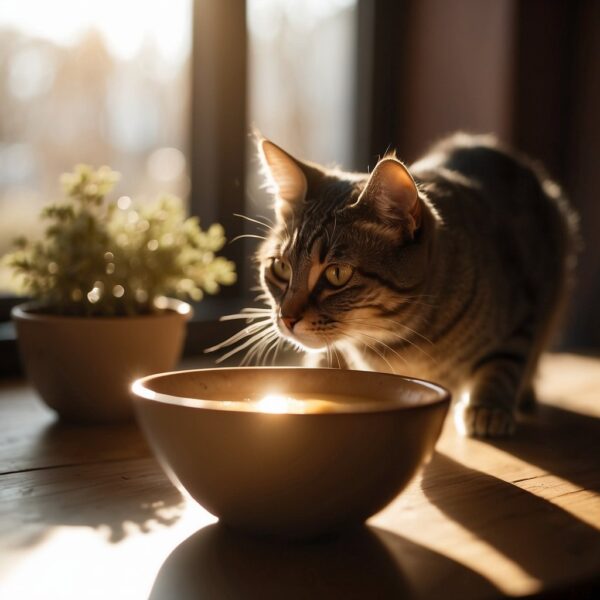
Cats And Bone Broth: Nutritional Benefits
Bone broth for cats has garnered attention as a supplement that can provide numerous health benefits. Rich in amino acids, proteins, and nutrients essential to feline health, this liquid is derived from simmering animal bones and connective tissues. Not only does it enhance hydration due to its moisture content, but it also supports digestion, bone strength, and joint health, making it a potentially valuable addition to your cat’s diet.
When considering bone broth for your feline friend, it is important to look for high-quality products or prepare it at home ensuring it is suitable and safe for cats. Ingredients and the source of the protein in the broth are of utmost importance. The broth should be free from harmful additives like onions, garlic, and excessive sodium which can be toxic to cats. Furthermore, it should be introduced slowly into the cat’s diet to avoid digestive upset and used as a supplement rather than a replacement for their regular meals.
Key Takeaways
- Bone broth provides hydration and nutrients beneficial for cats.
- Quality and safety of ingredients are crucial in choosing or preparing bone broth.
- It should supplement a balanced diet and be introduced gradually.
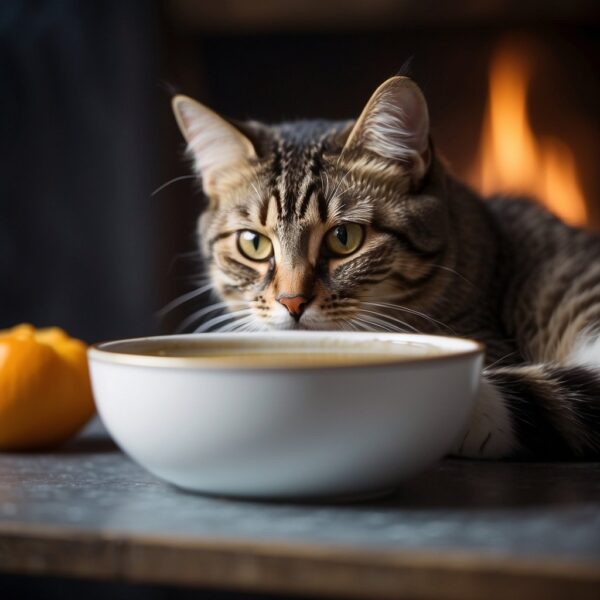
Understanding Bone Broth for Cats
Bone broth is an increasingly popular supplement for feline diets, offering hydration and rich nutrients that can enhance overall health. Here, we explore its definition, the benefits it provides to cats, and its key nutritional components.
What Is Bone Broth?
Bone broth is a nutrient-dense liquid made by simmering animal bones and connective tissues. Collagen, cartilage, and marrow release into the water, creating a rich source of proteins, amino acids, and minerals. As it cools, bone broth often gels due to gelatin, a cooked form of collagen.
Benefits of Bone Broth for Feline Health
Hydration is critical for cats, and bone broth can serve as an excellent source. Besides, it’s packed with health benefits such as:
- Joint health support: Glycosaminoglycans from cartilage and other compounds in the broth may aid in the prevention and relief of arthritis.
- Skin and coat improvement: The collagen helps maintain skin elasticity and contributes to a shiny, healthy coat.
- Digestive aid: Amino acids found in bone broth can support a healthy digestive system.
- Immune system booster: The concentration of nutrients can play a role in bolstering a cat’s immune system.
Nutritional Components
The nutritious makeup of bone broth is substantial and varied. It contains the following key elements:
- Collagen: Important for maintaining healthy joints and tissues.
- Amino acids: Fundamental building blocks for many bodily functions.
- Minerals: Such as calcium and magnesium, essential for bone health.
- Vitamins: Varied nutrients important for maintaining overall well-being.
| Nutrient | Role in Feline Health |
|---|---|
| Collagen | Supports joints, skin, and coat |
| Amino Acids | Building blocks for proteins, aids digestion |
| Minerals | Vital for bone and overall bodily functions |
| Vitamins | Various roles in maintaining health |
Offering bone broth can be an excellent way to supplement a cat’s diet with vital nutrients that support their health in multiple aspects.
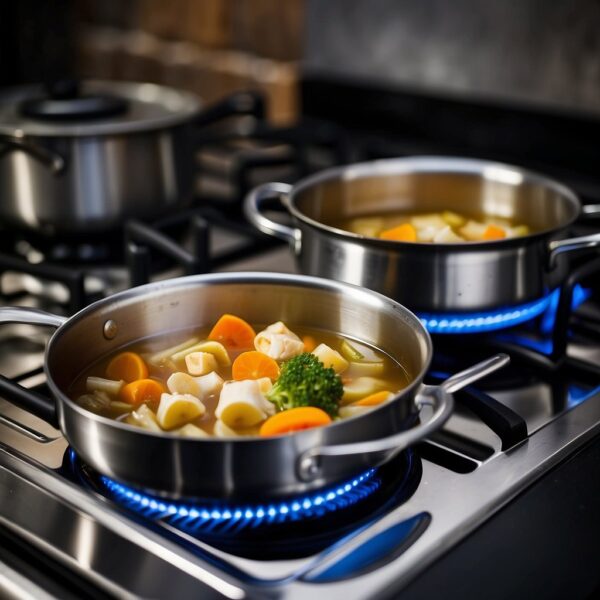
Preparing Bone Broth for Cats
In crafting bone broth for cats, the focus is on selecting quality ingredients, following a detailed cooking guide, and understanding the best practices for storing and serving to ensure safety and enhance your cat’s diet.
Selecting Ingredients
Choosing the right ingredients is crucial for a nutrient-rich bone broth that is safe for cats. A variety of unseasoned bones such as marrow, oxtail, or hooves from sources like grass-fed beef can form the base. Organic bones can be especially beneficial for avoiding unwanted chemicals. Adding cat-safe vegetables, like carrots and celery, can contribute additional nutrients. However, avoid using onions or garlic, as they can be toxic to cats. Instead, you can consider incorporating small amounts of cat-friendly options like tuna to enhance the flavor.
Bone Broth Cooking Guide
Begin by placing the chosen bones into a pot and covering them with water. The broth should be cooked on a low simmer to extract maximum nutrients and flavor. The simmering process allows the bones and any additional meaty pieces to break down properly, releasing vital nutrients into the broth. Aim for a long cooking time – typically around 8 to 24 hours – ensuring the bones become soft. Once cooked, the broth must be carefully strained to remove all solids, leaving behind only the nutrient-rich liquid.
Storing and Serving Tips
Proper storage is essential to maintain the broth’s quality. After cooling, the bone broth can be refrigerated for immediate use or frozen for long-term storage. To serve as a meal or food topper, simply pour the broth over your cat’s regular food, adding flavor and hydration. Another serving option is to thicken the broth slightly to create a gravy-like consistency. It’s important to introduce bone broth slowly into your cat’s diet to ensure they tolerate it well.
Incorporating Bone Broth in a Cat’s Diet
Incorporating bone broth into a cat’s diet can enhance flavor, encourage hydration, and stimulate appetite. It provides a savory complement to daily feeding routines without overwhelming the cat’s nutritional balance.
As a Supplement to Dry Food
- Method: Slowly mix bone broth into the cat’s dry food to soften it, making it easier for cats to eat and digest.
- Benefits:
- Enhances the flavor of the dry food, appealing to pickier eaters.
- Adds moisture, aiding in hydration which is beneficial for cats with low thirst drive.
As a Treat or Topper
- Serving: Offer bone broth as a separate treat or pour it over their regular meals as a topper.
- Frequency: Introduce as an occasional treat to maintain its special status and prevent overuse.
Hydration and Appetite Stimulation
- Hydration: The high water content in bone broth can be vital for cats, especially those that don’t consume enough water on their own.
- Appetite Stimulation:
- The rich flavor of bone broth can tempt cats with poor appetite to eat their meal.
- Served warm, it can also add enticing aromas that can lure hesitant cats to their food bowl.
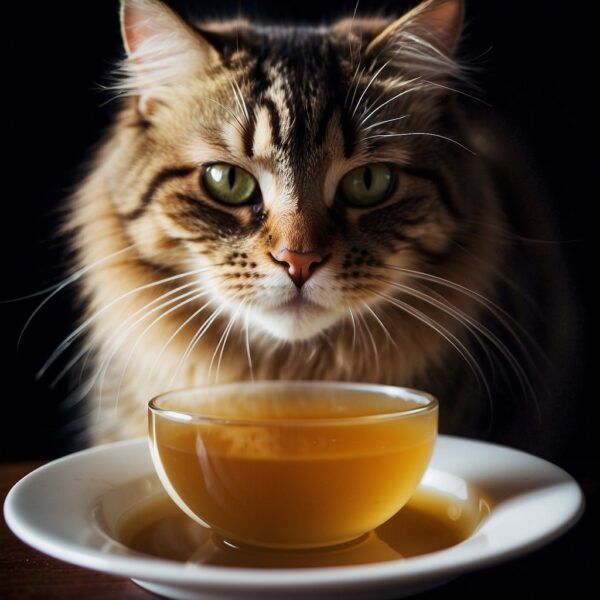
Safety and Precautions
When introducing bone broth into a cat’s diet, one must observe certain safety measures and understand the nutritional intricacies of feline dietary needs. Ensuring the right ingredients and nutritional balance is crucial for avoiding negative health impacts.
Safe Ingredients and Allergens
Ingredients: Cats require a diet that does not contain toxic substances. Safe bone broth for cats should be free of onions, garlic, and shallots, as these can cause hemolytic anemia in felines. In addition, avoid preservatives, colors, and artificial additives that may be present in human-grade bone broth.
Allergens: Cats, like humans, can have allergies. Monitor for any signs of allergic reactions when introducing a new food, such as bone broth, to their diet.
| Ingredients to Avoid | Safe Ingredients |
|---|---|
| Onions | Plain cooked bones |
| Garlic | Vegetables (limited) |
| Chives | |
| Preservatives | |
| Artificial colors | |
| Artificial additives |
Understanding Cats’ Dietary Needs
A balanced diet is vital for maintaining a cat’s overall health. Bone broth can be a beneficial add-on due to its nutrients, which can support joint health and the immune system. However, it should not replace a cat’s complete diet. Veterinarians can provide guidance on the appropriate quantity and frequency to complement a cat’s diet with bone broth.
Bone Broth and Cats with Health conditions
Certain health conditions: In cats with kidney disease or other illnesses affecting the stomach, bone broth’s high mineral content could exacerbate issues. It is essential to consult with a veterinarian before introducing bone broth to a cat with health conditions.
Overfeeding: Large quantities of bone broth could lead to an imbalance in the cat’s diet. One must ensure that any addition to the cat’s meals, including bone broth, does not disrupt their nutritional balance.
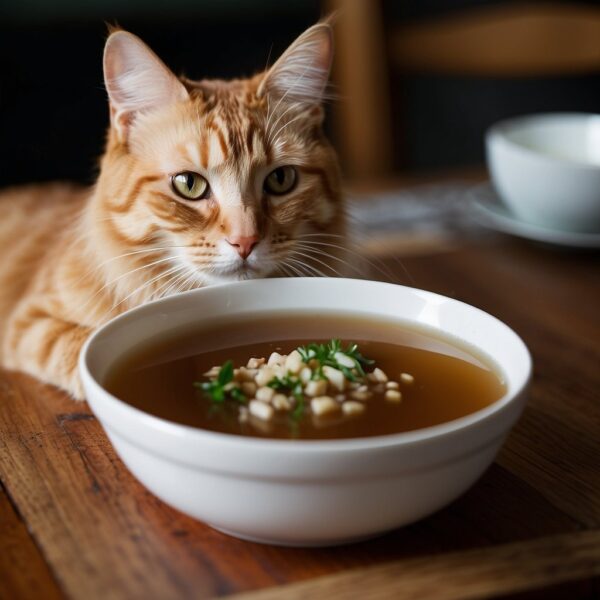
Frequently Asked Questions
Bone broth has gained attention as a nutritional supplement for felines, noted for its hydration benefits and rich protein content. This section addresses common inquiries regarding its use for cat health and nutrition.
What are the health benefits of bone broth for felines?
Bone broth is high in collagen, vitamins, and minerals, all of which can support feline health. It is beneficial for hydration and can provide extra nutrition, especially for cats with reduced appetites.
How can I prepare homemade bone broth that’s safe for my cat?
Homemade bone broth for cats can be made by simmering animal bones in water, ideally for 24 hours. It should be free from harmful additives like onions, garlic, and excess salt.
Are there any risks associated with feeding cats store-bought bone broth?
Some store-bought bone brands may contain additives or seasonings that are not safe for cats. Always check the ingredient list for cat-safe ingredients and avoid products with harmful additives.
What should I look for when choosing a commercial bone broth for my pet?
When selecting a commercial brand, it’s crucial to choose one with high-quality animal protein, devoid of harmful seasonings and additives.
Can bone broth help alleviate constipation in cats?
Because of its moisture content, bone broth can aid in hydration, which may help in preventing or alleviating constipation in cats.